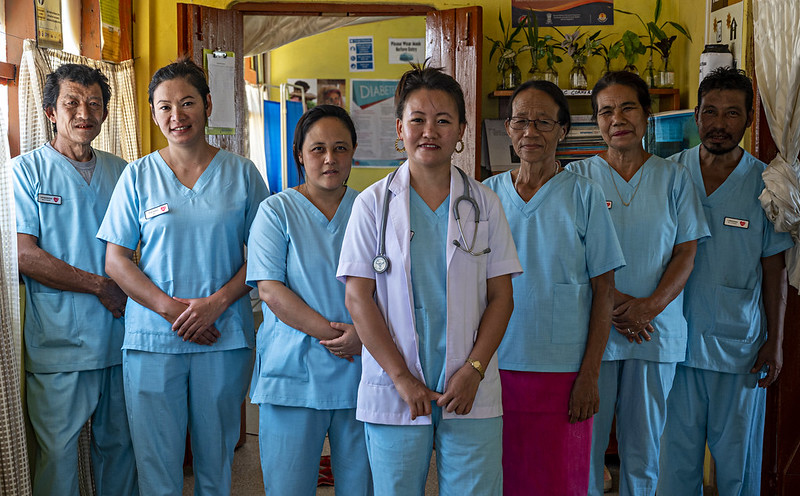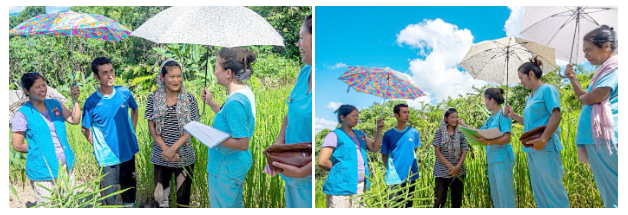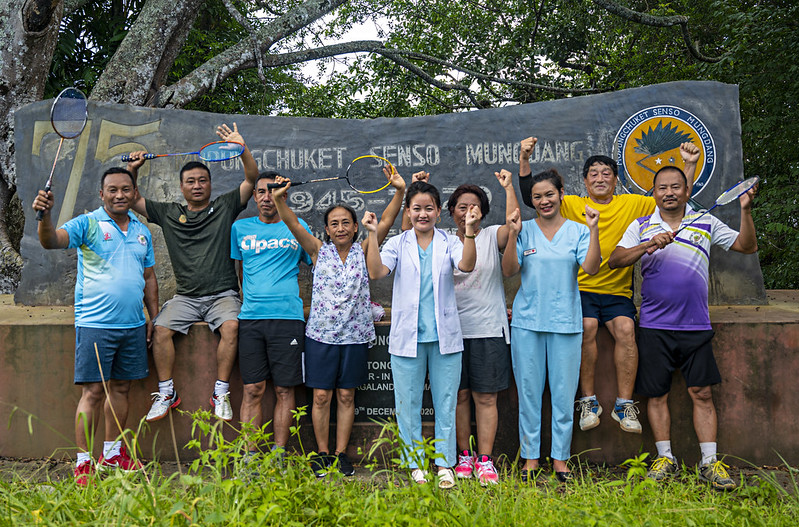A day in the life of a nurse and community health officer in Nagaland, India
By Krithika Murali, Katherine Seaton, and Kritika Gupta with support from Ojungsangla Longkumer
At 9 a.m., the Mopungchuket Health and Wellness Center in Nagaland, India, opens its doors and Nurse and Community Health Officer Rongsenlila Pongen and her dedicated team are poised and ready to provide compassionate care and services to the diverse range of individuals who will visit.
As the day unfolds, Rongsenlila’s commitment to community well-being shines through. A couple seeking family planning information finds a welcoming environment where she can openly discuss her needs and concerns. A child with a persistent cough is consoled by Rongsenlila’s reassurance as she seeks to alleviate the child’s discomfort. And an older man, in for a check-up, receives a thoughtful recommendation on how to manage his high blood pressure.

Nagaland, a mountainous and remote region in northeastern India, is where Rongsenlila grew up. Accessing health services has always been a challenge for her community, so when it came time to decide her career path, Rongsenlila chose to become a nurse and live and work among her neighbors. After receiving her professional nursing degree, she participated in a six-month community health officer certificate course that was supported by the Jhpiego-led NISHTHA: Transforming Comprehensive Health Care in India project, which is funded by the U.S. Agency for International Development. As the Mopungchuket Health and Wellness Center’s community health officer for four years, Rongsenlila works with Jhpiego and her team of auxiliary nurses and community health workers (called accredited social health activists, or ASHAs) to improve the health of every client and the community at-large.

Behind every successful health care provider, lies a passionate team of individuals who are dedicated to the well-being of their clients. They are the backbone of our center, working tirelessly to provide the best possible care to our clients, making sure our doors are open to all.”
Rongsenlila Pongen
Person-centered care: from birth to family planning
One of the first clients Rongsenlila sees this morning is Adangla, a mother of three who has been meeting with Rongsenlila often, both at the health center and in her home, for antenatal care and to learn more about her postpartum family planning options. Rongsenlila knows Adangla well and helped her through her third pregnancy, eventually delivering her baby at the health center. Now, she regularly conducts home visits to check on Adangla’s health and provide comprehensive couples counseling services.

Adangla and her husband, Lanumongba, conceived their first child when Adangla was just 14 years old. She delivered her first and second children at home because there were no health facilities nearby where she could give birth. Unfortunately, Adangla experienced complications during her second delivery that required her to be transported to a district hospital.
During high level meetings at the United Nations this month, international leaders discussed progress towards universal health coverage, global health security and resistant tuberculosis. A mainstay across these three areas is primary health workers, such as Rongsenlila. Investing in their education and strengthening and supplying the health system in which they work provides a proper foundation for gaining momentum and progress in achieving global goals.
In 2017, around the time Adangla was having trouble accessing the health services after her second pregnancy, India announced its Ayushman Bharat or “Healthy India” national initiative. This program transformed previous sub and primary health centers into 150,000 health and wellness centers, improving access to a larger suite of primary health care services for communities, including maternal and child health and non-communicable diseases, and free essential drugs and diagnostics.
NISHTHA has been part of this process, helping India transform their primary health care system to provide stronger, more responsive, accessible, sustainable and affordable services. The project partnered with the government to upgrade and operationalize 33,504 health facilities, including the Mopungchuket Health and Wellness Center, into functional primary health care centers. It also helps health workers, like Rongsenlila, build their clinical and leadership skills, roll out more services, strengthen supply chains, ensure access to medication and engage the community. NISHTHA has trained around 27,000 community health officers to lead primary health care teams—providing approximately 143 million people with access to high-quality, comprehensive primary health care services in India.
Today, Adangla and Lanumongba are back at the Mopungchuket center to discuss their family planning needs. They want to pause having children for a few years but need more information about what method they should choose. They sit down with Rongsenlila and, after receiving counseling and reviewing all of their family planning options, Adangla and Lanumongba choose a family planning option that works best for them.

Choosing a family planning method made me realize that I have a complete right to make decisions for myself. Today, I feel healthy and empowered.”
Adangla
As the couple leaves, Rongsenlila welcomes a mother whose son has a persistent cough. Rongsenlila uses a stethoscope to carefully listen to the child’s breathing. She determines the boy has a virus and calls a doctor for a teleconsultation. The doctor prescribes medicine for the cough, which Rongsenlila dispenses to the boy’s mother.

Leveraging technology for quality health care
More and more, Rongsenlila uses digital health tools and telehealth options to meet with doctors, streamline processes, document health services provided and keep up to date with relevant trainings. She often uses a mobile application called iLearn, which was developed by Jhpiego and adopted by the government of Nagaland. It allows community health officers to take courses on their own time via self-guided courses on their photos or computers

To help her understand and use these tools for data surveillance, Angelina Jungi, a surveillance program officer for Jhpiego’s NISHTHA project, meets with Rongsenlila to review data on a mobile phone and discuss the health center’s cases and progress. As they pour over data, Rongsenlila updates a chart posted on the center’s wall for her whole team to see. It’s a reminder to the team that they’re making a difference in their community every single day.
“It’s a privilege to be able to give back to the community that has given me so much,” she says. “It brings me great satisfaction to be able to use my skills and knowledge to heal, support and empower others.”

Treatment that goes beyond symptoms
As the day progresses, an elderly man, burdened by worries of high blood pressure, steps in for a check-up. Rongsenlila’s holistic approach comes to the forefront as she addresses his medical concerns and takes the time to understand his lifestyle and challenges. She suggests the client join the Native Shuttle Academy for badminton lessons. Two years ago, Rongsenlila collaborated with the gym to encourage clients at the health center to get more exercise. Now, community members are learning about the benefits of playing sports, which is reducing the stress of diseases like hypertension, diabetes and heart diseases among Nagaland’s older population.

As her day ends, Rongsenlila reflects on her work and the community she serves. She’s a symbol of the endurance and resilience most nurses in India need to provide primary health care to citizens in need.
Every day, I am inspired by the resilience and strength of the people in Mopungchuket. And I am humbled by the trust they have placed in me to help safeguard their health and wellness.”
Rongsenlila Pongen

Chantelle Allen, Sr. Technical Advisor for Primary Health Care, provided technical review of this article.
Krithika Murali is a documentation and knowledge management advisor for Jhpiego India. Katherine Seaton is a communications manager in Jhpiego’s U.S. office. Kritika Gupta is a consultant for Jhpiego. Ojungsangla Longkume is a program officer for Jhpiego India.
Photos by Imnasenla Jamir.



